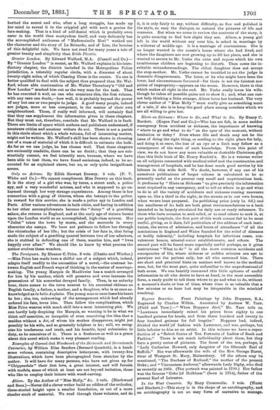Hints on Sickness : Where to Go, and What to
Do. By Henry C. Burdett. (Kagan Peal and Co.)—Who has not felt, in some sudden emergency from accident or sickness, the importance of knowing " where to go and what to do " on the spur of the moment, without hesitation or delay ? Even where life and death may not be the issue of doing the right thing, or sending to the right place for help, and doing it at once, the loss of an eye or a limb may follow as a consequence of the want of such knowledge. From this point of view, we do not know any more valuable or desirable Christmas gift than this little book of Mr. Henry Burdett's. He is a veteran writer on all subjects connected with medical relief and the construction and management of hospitals, and he has done mach good service by his labours in this wide field. We doubt, however, if any one of his numerous publications of larger volume is calculated to be so generally useful as the present very small and unpretentious book. It professes by " Hints on Sickness " to give precisely the information most required in any emergency, and to tell us where to go and what to do in all the variety of accidents and sickness coming unawares upon us, like a thief in the night, in the streets or in our own homes, when we are least prepared. Its publishing price (only Is. 6d.) and the smallness of its balk are both great recommendations to a book intended to be largely circulated for daily use or ready reference. To those who have occasion to seek relief, or to send others to seek it, at our public hospitals, the first part of this work cannot fail to be most useful, giving, as it does, full particulars of the address of each insti- tution, the terms of admission, and hours of attendance "of all the institutions in England and Wales founded for the relief of diseases or bodily infirmity," including hospitals for infections cases, con- valescent homes, mineral-water establishments, and others. The second part will be found more especially useful perhaps, as it gives instructions " What to do " in all the more common accidents and emergencies of life, where sickness or sudden seizures are apt to paralyse not the patient only, but all who surround him. There are short and practical hints on matters well known to the medical man, but, for the most part, quite unfamiliar to the unprofessional of both sexes. We can heartily commend this little epitome of useful information to all who desire to have at hand, in the most accessible form, a ready guide to tell them where to go and what to do, without a moment's doubt or loss of time, where time is so valuable that a few minutes or an hour lost may be irreparable in the mischief resulting.


































 Previous page
Previous page